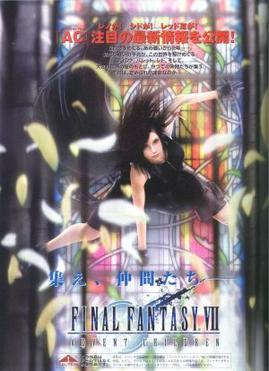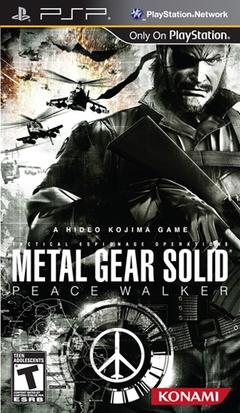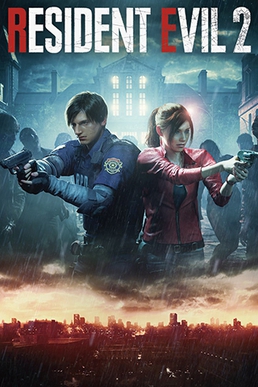Resident Evil, known as Biohazard in Japan, is a Japanese horror game series and media franchise created by Capcom. It consists of survival horror, third-person shooter and first-person shooter games, with players typically surviving in environments inhabited by zombies and other mutated creatures. The franchise has expanded into other media, including a live-action film series, animated films, television series, comic books, novels, audiobooks, and merchandise. Resident Evil is the highest-grossing horror franchise.

The Cactuar, known in Japan as Sabotender is a fictional species of plant-like beings from the Final Fantasy video game franchise. They are usually depicted as anthropomorphic cacti with haniwa-like faces in a running or dashing pose. One of the recurring elements of the series, it initially appeared as an enemy in Final Fantasy VI. By the 2010s, the Cactuar has attained widespread popularity with Final Fantasy fans, and is considered one of the established mascots of the long-running series alongside the Moogle and the Chocobo. While the Cactuar still appear as recurring enemies in modern titles, they are also depicted as summoned allies as well as friendly non-player characters.

The PlayStation Portable (PSP) is a handheld game console developed and marketed by Sony Computer Entertainment. It was first released in Japan on December 12, 2004, in North America on March 24, 2005, and in PAL regions on September 1, 2005, and is the first handheld installment in the PlayStation line of consoles. As a seventh generation console, the PSP competed with the Nintendo DS.

Final Fantasy VII: Advent Children is a 2005 Japanese adult animated science fantasy action-adventure film directed by Tetsuya Nomura, written by Kazushige Nojima, and produced by Yoshinori Kitase and Shinji Hashimoto. Developed by Visual Works and Square Enix, Advent Children is part of the Compilation of Final Fantasy VII series of media, which is based in the world and continuity of the 1997 role-playing video game Final Fantasy VII. Final Fantasy VII: Advent Children was released on DVD and Universal Media Disc with Japanese voice acting in Japan on September 14, 2005, and on April 25, 2006 with English voice acting in North America and the UK.
Jill Valentine is a character in Resident Evil, a survival horror series created by the Japanese company Capcom. She was introduced as one of two player characters in the original Resident Evil (1996) with her partner, Chris Redfield, as a member of the Raccoon City Police Department's Special Tactics And Rescue Service (STARS) unit. Jill and Chris fight the Umbrella Corporation, a pharmaceutical company whose bioterrorism creates zombies and other bio-organic weapons, and later become founding members of the United Nations' Bioterrorism Security Assessment Alliance (BSAA).
Leon Scott Kennedy is a character in the Resident Evil survival horror video game series created by the Japanese company Capcom. He was introduced as one of the two player characters in the video game Resident Evil 2 (1998), alongside Claire Redfield. The character was initially conceived as a veteran police officer for the prototype of the game, but he was redesigned as a young rookie by Noboru Sugimura. During the events of Resident Evil 2, Leon arrives in the doomed Raccoon City late for his first day on the job and is confronted by a zombie outbreak.

Chris Redfield is a character in the Resident Evil survival horror video game series created by the Japanese company Capcom. He was introduced as one of the two playable characters of the original Resident Evil (1996), alongside his partner Jill Valentine, as a member of the Raccoon Police Department's Special Tactics and Rescue Service (S.T.A.R.S.) unit. Chris and Jill fight against the Umbrella Corporation, a pharmaceutical company whose bioterrorism creates zombies and other bio-organic weapons. Later, the pair became founding members of the United Nations' Bioterrorism Security Assessment Alliance (BSAA).

Resident Evil 5 is a 2009 third-person shooter video game developed and published by Capcom. It is a major installment in the Resident Evil series, and was released for the PlayStation 3 and Xbox 360 consoles in March 2009 and for Windows in September 2009. It was re-released for PlayStation 4 and Xbox One in June 2016. The plot involves an investigation of a terrorist threat by Bioterrorism Security Assessment Alliance agents Chris Redfield and Sheva Alomar in Kijuju, a fictional region of West Africa. Chris learns that he must confront his past in the form of an old enemy, Albert Wesker, and his former partner, Jill Valentine.

Monster Hunter Freedom 2 is an action role-playing video game developed and published by Capcom for the PlayStation Portable. It is the second handheld installment in the Monster Hunter franchise. Marketed as a sequel to Monster Hunter Freedom, Freedom 2 is an original title that adapts the core content of Monster Hunter 2 into a new single player campaign, adding supplemental original content.
2008 saw many new installments in established video game franchises, such as Grand Theft Auto IV, Fallout 3, Metal Gear Solid 4: Guns of the Patriots, Gears of War 2, Super Smash Bros. Brawl, Persona 4, Fable II, Call of Duty: World at War, Mario Kart Wii, Madden NFL 09, NBA Live 09, NBA 2K9, and WWE Smackdown vs. Raw 2009. New intellectual properties included Army of Two, Dead Space, Left 4 Dead, LittleBigPlanet, Mirror's Edge, iRacing, Race Driver: Grid, and Spore.

Monster Hunter Freedom Unite is an action role-playing game developed and published by Capcom for the PlayStation Portable and iOS. It is an expanded version of the original Monster Hunter Freedom 2 and was released on March 27, 2008, in Japan as Monster Hunter Portable 2nd G.

Dead Rising 2 is a 2010 action-adventure game developed by Blue Castle Games and published by Capcom. It was released between September and October 2010 for the PlayStation 3, Xbox 360, and Microsoft Windows. It is a sequel to Dead Rising, and is the second entry in the series of the same name. The game features a number of new features and improvements to its predecessor, including multiplayer options.

Call of Duty: World at War is a 2008 first-person shooter game developed by Treyarch and published by Activision. It is the fifth main installment of the Call of Duty series and is the fourth entry in the series to be set during World War II. The game was announced by Activision in June 2008 and was released in November 2008, for PlayStation 3, Windows, Xbox 360, and Wii. Other games under the World at War title were published for the Nintendo DS and PlayStation 2, featuring different storylines and missions.

Resident Evil 6 is a 2012 third-person shooter video game developed and published by Capcom. A major installment in the Resident Evil series, Resident Evil 6 was released for the PlayStation 3 and Xbox 360 in October 2012, and for Windows in March 2013. It was re-released with all downloadable content for the PlayStation 4 and Xbox One in March 2016, and for the Nintendo Switch in October 2019. Players control Leon S. Kennedy, Chris Redfield, Jake Muller and Ada Wong as they confront the force behind a worldwide bio-terrorist attack. The story is centred around their four interwoven campaigns, and every campaign features a unique style in both tone and gameplay.

Lumines Supernova is a puzzle video game, the fourth main entry in the Lumines series. The game was published and developed by Q Entertainment with original series creator Tetsuya Mizuguchi as the game designer and Katsumi Yokota as director. The game was released on the PlayStation Network in December 2008 for Japan and North America. The objective of the game is to arrange 2×2 blocks varying between two colors into same-colored squares by moving them, rotating, and dropping them in a 16×10 playing field while a timeline sweeps from left to right and clears the completed squares and awards points to the players. It features all of the previous game modes that Lumines Live! implemented except for online multiplayer, as well as an expanded version of the Sequencer from Lumines II and a new mode, DigDown Mode. Lumines Supernova was received positively among reviewers, with some adding it to their Top-rated lists. However, the game was criticized for the lack of online multiplayer that was previously introduced in the series.

Metal Gear Solid: Peace Walker is a 2010 stealth game developed and published by Konami. It is the seventh Metal Gear game written, directed, and designed by Hideo Kojima, and the fifth installment of the Metal Gear Solid series, as well as the fourth Metal Gear game made specifically for the PlayStation Portable, following Metal Gear Solid: Portable Ops. A remastered version of the game titled Metal Gear Solid: Peace Walker - HD Edition was later released for the PlayStation 3 and Xbox 360 as part of the Metal Gear Solid HD Collection in North America and Europe and as a stand-alone retail release in Japan.

Corrinne Yu is an American game programmer. She has worked on games including King's Quest, Quake II, and Halo 4. Her engine work included Unreal Engine 3, Microsoft's Direct3D Advisory Board, and CUDA and GPU simulation at Nvidia. She has also designed accelerator experiments for nuclear physics research.

The PlayStation Vita is a handheld game console developed and marketed by Sony Computer Entertainment. It was first released in Japan on December 17, 2011, then in other international territories on February 22, 2012, and was produced until discontinuation on March 1, 2019. The console is the successor to the PlayStation Portable (PSP), and a part of the PlayStation brand of gaming devices; as part of the eighth generation of video game consoles, it primarily competed with the Nintendo 3DS.

The Playroom is a video game developed by Japan Studio's Team Asobi and published by Sony Computer Entertainment for the PlayStation 4. It is a collection of augmented reality mini-games meant to demonstrate the use of the PlayStation Camera and the DualShock 4 controller and comes preloaded with all PlayStation 4 consoles. The PlayStation Camera accessory is required to play The Playroom. If a camera is not present, a trailer for The Playroom will be displayed instead of the full game. Firesprite, a studio founded by former employees of Studio Liverpool, worked on the visuals of The Playroom. Downloadable content is free.

Resident Evil 2 is a 2019 survival horror game developed and published by Capcom. A remake of the 1998 game Resident Evil 2, it was released for PlayStation 4, Windows, and Xbox One in January 2019 and for Amazon Luna, PlayStation 5, Xbox Series X/S and Nintendo Switch in 2022. Versions for iOS, iPadOS, and macOS were released in December 2024. Players control the rookie police officer Leon S. Kennedy and the college student Claire Redfield as they attempt to escape Raccoon City during a zombie outbreak.
















